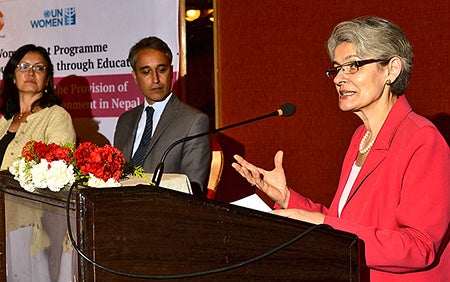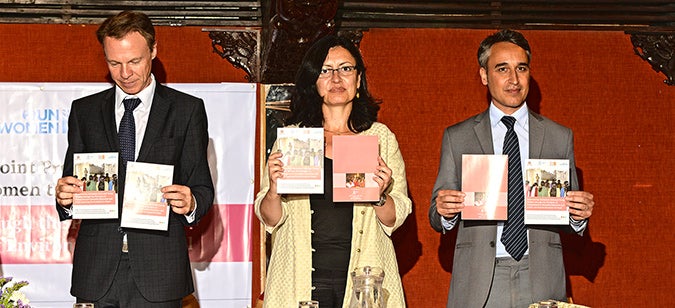Government of Nepal and UN launch joint programme for education and women’s empowerment
Date:
Kathmandu, Nepal – Heads of UNESCO, UN Women and UNFPA in Nepal jointly launched an education programme uncovering a programme brochure in Kathmandu today. The launch programme Empowering Adolescent Girls and Young Women through Education was graced by UNESCO Director General Irina Bokova who spearheaded this joint initiative at the global UN level last year.

“This partnership brings together our respective strengths to break the cycle of exclusion and vulnerability, to ensure that girls benefit from a full cycle of quality education, in line with the promise of Sustainable Development Goal 4,” said UNESCO Director-General Irina Bokova.

UN Women Representative to Nepal Ziad Sheikh affirmed, “The joint programme we launch today echoes these commitments by empowering adolescent girls and young women through education: empowered to make informed decisions about their lives and empowered to travel a path of greater opportunities.”

Similarly, UNFPA Representative to Nepal Ms Giulia Vallese, stressed that ensuring girls’ health and education, especially their sexual and reproductive health and rights, is a crucial dimension of the 2030 Agenda: “Providing adolescent girls and young women access to sexual and reproductive health information, and services, advances gender equality and the achievement of internationally agreed goals,” she said.
Despite Nepal’s strides in the areas of education and literacy, with near universal enrolment in primary education, gender disparities persist and are more pronounced among poorer, more vulnerable sections of the population.
Speaking at the programme, Minister for Education Giriraj Mani Pokhrael said, “Nepal’s new constitution takes a right based approach to education and mandates providing free quality education as a fundamental right, regardless of ethnicity, gender, caste, class or remote locations.” Minister Pokhrael expressed that although barriers to education still exists, Nepal has made great strides in education, and that the net enrollment rate has increased at all levels and gender parity fully achieved.
Representative Ziad Sheikh agreed that while primary school enrollment rates for girls are encouraging in Nepal, there also need to be opportunities and options for them to go higher. He explained, “as efforts are strengthened to ensure quality and safe education for all, at all levels, there need to be complementary efforts to promote women’s economic empowerment.”
Global experience shows that an increase in female labour force participation leads to faster economic growth. Expanding the economic capabilities of young women can lead to higher incomes, access to and control over resources, and greater security, including protection from violence.
Through the joint programme, UN Women will support 4,000 out-of-school adolescent girls and young women with technical and vocational education and training, building on our existing partnerships and experience with networks of excluded women through our extensive programme for women’s economic empowerment. Nepal’s current women economic empowerment programmes include Advancing Women’s Economic Empowerment – Ensuring Nepal’s Sustainable and Equitable Development programme implemented with support from the Government of Finland and the Rural Women’s Economic Empowerment Joint Program run with support from the Multi Partner Trust Fund.
Together with Nepal, the joint programme will be rolled out in 20 countries where the education gender gap is most critical including Mali, Niger, Pakistan, South Sudan and the United Republic of Tanzania—with a specific focus on adolescent girls and young women between the ages of 10 and 24.
For more information:
Please contact: Monica Upadhyay
Communications Officer, UN Women Nepal Country Office.
Email: [ Click to reveal ]